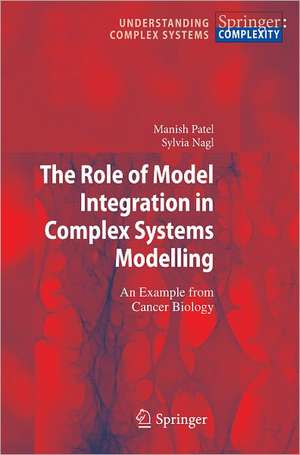The Role of Model Integration in Complex Systems Modelling: An Example from Cancer Biology: Understanding Complex Systems
Autor Manish Patel, Sylvia Naglen Limba Engleză Hardback – 8 sep 2010
A two-tier model integration strategy, including a knowledge-driven approach to address model semantics, was developed to tackle these challenges. In the first step a novel description of models at the level of behaviour, rather than the precise mathematical or computational basis of the model, is developed by distilling a set of abstract classes and properties. These can accurately describe model behaviour and hence describe focus in a way that can be integrated with behavioural descriptions of other models. In the second step this behaviour is decomposed into an agent-based system by translating the models into local interaction rules.
The book provides a detailed and highly integrated presentation of the method, encompassing both its novel theoretical and practical aspects, which will enable the reader to practically apply it to their model integration needs in academic research and professional settings. The text is self-supporting. It also includes an in-depth current bibliography to relevant research papers and literature. The review of the current state of the art in tumour modelling provides added value.
| Toate formatele și edițiile | Preț | Express |
|---|---|---|
| Paperback (1) | 634.68 lei 43-57 zile | |
| Springer Berlin, Heidelberg – 15 oct 2014 | 634.68 lei 43-57 zile | |
| Hardback (1) | 639.25 lei 43-57 zile | |
| Springer Berlin, Heidelberg – 8 sep 2010 | 639.25 lei 43-57 zile |
Din seria Understanding Complex Systems
- 18%
 Preț: 1112.30 lei
Preț: 1112.30 lei -
 Preț: 439.25 lei
Preț: 439.25 lei - 18%
 Preț: 1119.38 lei
Preț: 1119.38 lei - 15%
 Preț: 401.82 lei
Preț: 401.82 lei - 18%
 Preț: 1247.26 lei
Preț: 1247.26 lei - 15%
 Preț: 641.20 lei
Preț: 641.20 lei - 15%
 Preț: 642.68 lei
Preț: 642.68 lei - 15%
 Preț: 651.51 lei
Preț: 651.51 lei - 18%
 Preț: 946.55 lei
Preț: 946.55 lei - 18%
 Preț: 947.98 lei
Preț: 947.98 lei - 20%
 Preț: 650.27 lei
Preț: 650.27 lei - 18%
 Preț: 952.09 lei
Preț: 952.09 lei - 18%
 Preț: 957.13 lei
Preț: 957.13 lei - 18%
 Preț: 943.88 lei
Preț: 943.88 lei -
 Preț: 398.35 lei
Preț: 398.35 lei - 5%
 Preț: 1417.54 lei
Preț: 1417.54 lei - 15%
 Preț: 648.42 lei
Preț: 648.42 lei -
 Preț: 387.75 lei
Preț: 387.75 lei - 18%
 Preț: 1133.76 lei
Preț: 1133.76 lei - 18%
 Preț: 948.16 lei
Preț: 948.16 lei - 20%
 Preț: 655.85 lei
Preț: 655.85 lei - 18%
 Preț: 1113.09 lei
Preț: 1113.09 lei - 20%
 Preț: 655.53 lei
Preț: 655.53 lei - 15%
 Preț: 653.00 lei
Preț: 653.00 lei - 18%
 Preț: 1332.92 lei
Preț: 1332.92 lei - 18%
 Preț: 1010.48 lei
Preț: 1010.48 lei - 18%
 Preț: 955.56 lei
Preț: 955.56 lei -
 Preț: 384.22 lei
Preț: 384.22 lei - 18%
 Preț: 950.66 lei
Preț: 950.66 lei - 15%
 Preț: 638.43 lei
Preț: 638.43 lei - 15%
 Preț: 644.49 lei
Preț: 644.49 lei - 15%
 Preț: 647.40 lei
Preț: 647.40 lei - 15%
 Preț: 649.06 lei
Preț: 649.06 lei - 15%
 Preț: 643.65 lei
Preț: 643.65 lei - 18%
 Preț: 960.78 lei
Preț: 960.78 lei - 15%
 Preț: 649.87 lei
Preț: 649.87 lei - 15%
 Preț: 645.47 lei
Preț: 645.47 lei
Preț: 639.25 lei
Preț vechi: 752.06 lei
-15% Nou
Puncte Express: 959
Preț estimativ în valută:
122.36€ • 132.95$ • 102.85£
122.36€ • 132.95$ • 102.85£
Carte tipărită la comandă
Livrare economică 21 aprilie-05 mai
Preluare comenzi: 021 569.72.76
Specificații
ISBN-13: 9783642156021
ISBN-10: 3642156029
Pagini: 180
Ilustrații: X, 168 p.
Dimensiuni: 155 x 235 x 17 mm
Greutate: 0.39 kg
Ediția:2010
Editura: Springer Berlin, Heidelberg
Colecția Springer
Seria Understanding Complex Systems
Locul publicării:Berlin, Heidelberg, Germany
ISBN-10: 3642156029
Pagini: 180
Ilustrații: X, 168 p.
Dimensiuni: 155 x 235 x 17 mm
Greutate: 0.39 kg
Ediția:2010
Editura: Springer Berlin, Heidelberg
Colecția Springer
Seria Understanding Complex Systems
Locul publicării:Berlin, Heidelberg, Germany
Public țintă
ResearchCuprins
Nature to Numbers: Complex Systems Modelling of Cancer.- Coping with Complexity: Modelling of Complex Systems.- Complexity and Model Integration: Formalisations.- Novel Strategies for Integrating Models into Systems-Level Simulations.- Experiments in Model Integration.- Discussion.
Textul de pe ultima copertă
Model integration – the process by which different modelling efforts can be brought together to simulate the target system – is a core technology in the field of Systems Biology. In the work presented here model integration was addressed directly taking cancer systems as an example. An in-depth literature review was carried out to survey the model forms and types currently being utilised. This was used to formalise the main challenges that model integration poses, namely that of paradigm (the formalism on which a model is based), focus (the real-world system the model represents) and scale.
A two-tier model integration strategy, including a knowledge-driven approach to address model semantics, was developed to tackle these challenges. In the first step a novel description of models at the level of behaviour, rather than the precise mathematical or computational basis of the model, is developed by distilling a set of abstract classes and properties. These can accurately describe model behaviour and hence describe focus in a way that can be integrated with behavioural descriptions of other models. In the second step this behaviour is decomposed into an agent-based system by translating the models into local interaction rules.
The book provides a detailed and highly integrated presentation of the method, encompassing both its novel theoretical and practical aspects, which will enable the reader to practically apply it to their model integration needs in academic research and professional settings. The text is self-supporting. It also includes an in-depth current bibliography to relevant research papers and literature. The reviewof the current state of the art in tumour modelling provides added value.
A two-tier model integration strategy, including a knowledge-driven approach to address model semantics, was developed to tackle these challenges. In the first step a novel description of models at the level of behaviour, rather than the precise mathematical or computational basis of the model, is developed by distilling a set of abstract classes and properties. These can accurately describe model behaviour and hence describe focus in a way that can be integrated with behavioural descriptions of other models. In the second step this behaviour is decomposed into an agent-based system by translating the models into local interaction rules.
The book provides a detailed and highly integrated presentation of the method, encompassing both its novel theoretical and practical aspects, which will enable the reader to practically apply it to their model integration needs in academic research and professional settings. The text is self-supporting. It also includes an in-depth current bibliography to relevant research papers and literature. The reviewof the current state of the art in tumour modelling provides added value.
Caracteristici
First book on Complex Systems Science And Systems Biology of Cancer with outstanding importance for systems biology and tumour modeling Contains advanced mathematical and computation principles applied to complex systems theory using tumours as an example Includes an in-depth critical study of the current state of the literature concerning modelling and simulation of tumour systems








